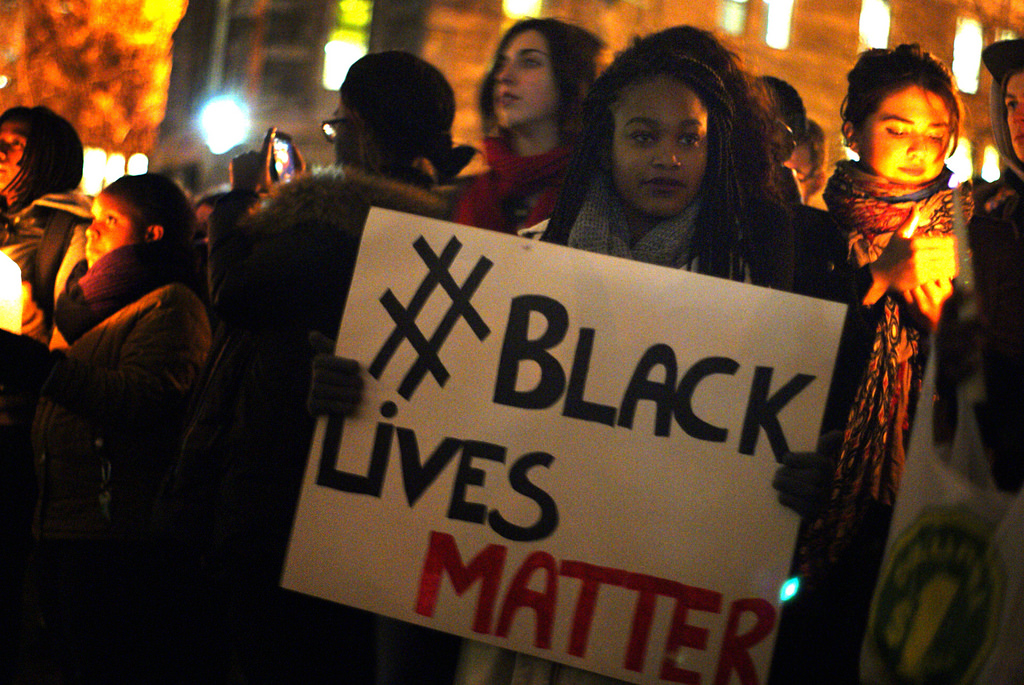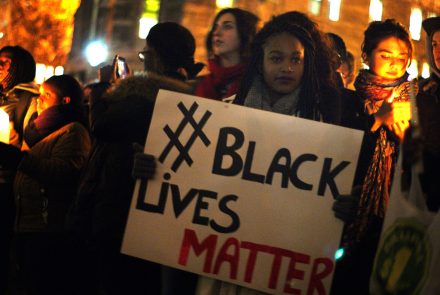A Conversation on Alton Sterling, Philando Castile, and Black Lives Matter


Two of our staff members, who are millennial women of color feminists, came together for a conversation, reacting to the murders of Alton Sterling and Philando Castile and why the Black Lives Matter movement should matter to you if you care about women’s issues.
Yumhee Park (YP): Why is talking about Alton Sterling, Philando Castile, and the Black Lives Matter movement important to you as a black feminist?
Nia Evans (NE): The Black Lives Matter (BLM) movement was founded by three queer, black feminists. Black feminism is the root of this movement, and we see it in the formation of the network, the decentralized leadership, the strategic actions, and the collective care. BLM is not just asking for access to power, the movement wants to transform the nature of power in this country. If that isn’t a feminist mission, what is?
YP: How did you hear about the murder of Alton Sterling and Philando Castile? How did it make you feel?
NE: Black Twitter, that vital ecosystem of activists, journalists, intellectuals, organizers, and agitators, told me about the murders of Alton Sterling and Philando Castile. I watched the videos, read mainstream media coverage, and then I had to retreat into my mind.
I’m tired. I wish there were another way of saying it, but I am tired of watching the murders of Black people. I don’t need a video to know that the death of another Black person was unjustified. I am tired of the fear and anger that bubbles to my chest every time it happens. I’m sick to death of the respectability politics that insist life is a privilege.
Three years ago, I had never seen anyone die. Now, I’ve lost count.
YP: I was on the bus when I read in horror about Philando Castile, the second black man to be killed in the span of 48 hours and how his murder was caught on Facebook Live. I went about my commute to work. I thanked the bus driver, a Black woman, as I got off on my stop and wondered if she had someone in her life she feared for. I walked through downtown Washington, D.C., and met eyes with a trash cleaner, a Black man. We nodded hello to each other, and I wondered if he was asking himself, “Am I next?”
Scrolling through my Facebook feed, people who are involved in the social justice community posted their thoughts and statements of solidarity on the murders of Alton Sterling and Philando Castile. But I saw nothing from my Asian-American network.
NE: Can you talk about how you think the Asian-American community responds to anti-Blackness?
YP: Asian-Americans are taught early on by our culture to keep our heads down, work hard, and fit in, and we’ll have a shot at success. That means being quiet. That means turning the other way. That means we don’t dare to be disruptive.
But, who are we helping? What is this complacency for?
While there are Asian-Americans who have led and continue to lead powerful movements to advance civil rights, our culture’s calling to keep our heads down and continue walking is pervasive. But by continuing to keep our heads down, by continuing to be silent, by continuing to turn away, we are being complacent to white supremacy. We are feeding a system that pits communities of color against each other for their own gain. We are participating in a system that keeps white men in power and women of color down.
NE: I think that’s the genius of white supremacy – the myth of finite resources. The idea that “if I get, you won’t receive.” This idea is driving anti-immigrant sentiment across the globe.
There are so many strategies used to separate our communities. White supremacy uses the media, the “model minority” myth, and the false promises of meritocracy to infuse anti-Blackness into immigrant communities. They say Black people are lazy, stupid, useless, dangerous, and responsible for their own circumstances. It might not be easy in the United States, but hey, at least you’re not Black.
And in response, Black communities tend to be wary of immigrant communities, even, and perhaps most especially, Black immigrant communities. There are enormous tensions between African-Americans and our brothers and sisters in the diaspora. We have intersecting struggles, but radically different histories. We need to be honest and open about these tensions within our communities.
It’s certainly not easy. We cannot just reach across difference. We need to sit with difference and recognize the tensions, narratives, and myths that separate communities of color. We need to work to understand them and build our support for each other with difference and empathy as a base. I think we’re seeing fantastic examples of this work across the country.
NE: Why is it important for all of us to continue talking about it as feminists?
YP: From the Civil Rights movement of the 1960s to the Black Lives Matter movement happening now, so much of civil rights work throughout history has been done at the expense of Black people, on the backs of Black people, particularly Black women. Feminism needs to center the most marginalized voices, and begin by transforming that nature of power in our own movements. That starts with saying out loud that what happened to Alton Sterling, Philando Castile, and countless other Black people is not okay to our fellow feminists. If we say we care about the wage gap, reproductive justice, and education for all girls and women, it needs to start with the people most affected by these issues. If we want to start enacting real change, we need to start by saying Black lives matter.



